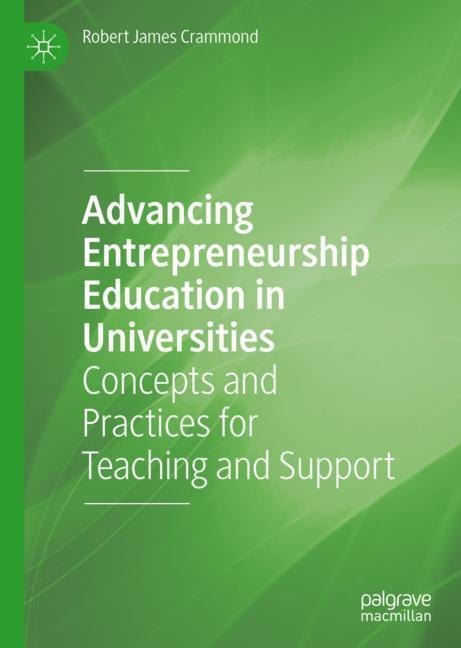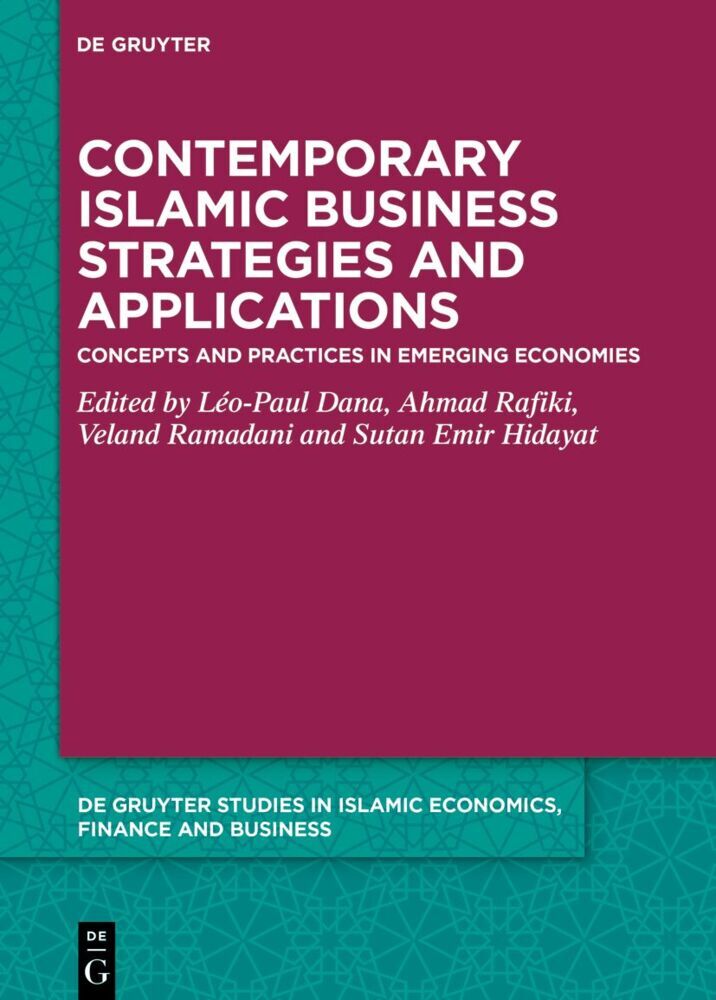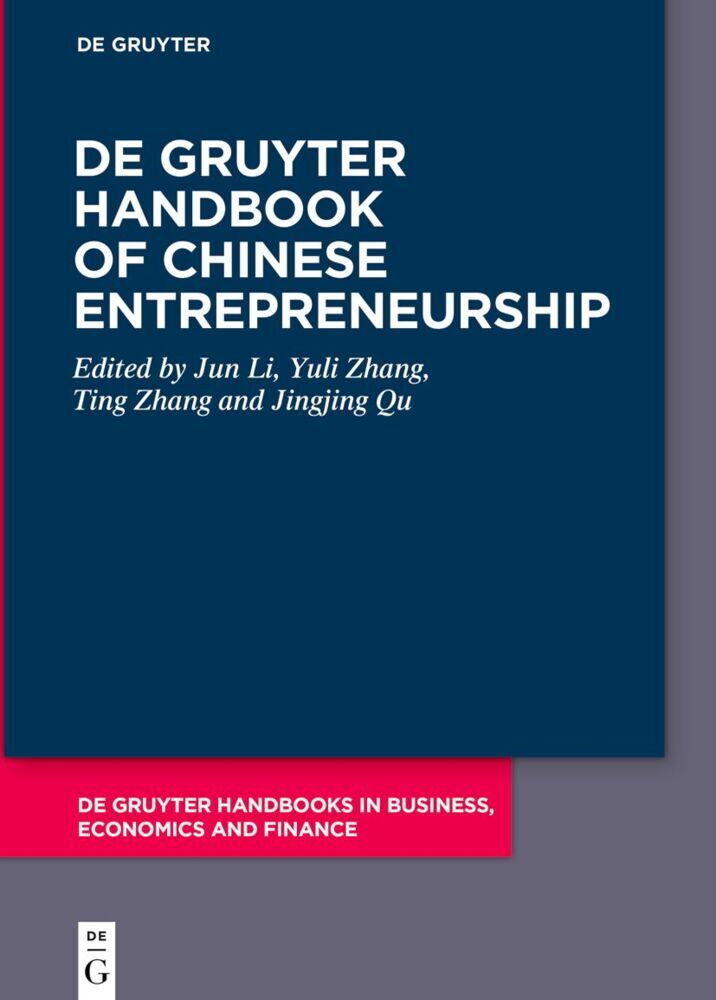Advancing Entrepreneurship Education in Universities
Concepts and Practices for Teaching and Support
In the context of the changing nature of universities, this book discusses the progression of enterprise and entrepreneurship education, and conceptualises 'best practice' with the aim of enhancing teaching and support for entrepreneurs. Including an overview of entrepreneurship, teaching entrepreneurship, enterprising universities and industrial ecosystems, the author also discusses stakeholder theory and analysis, concluding with a perspective on effective and enterprising learning spaces. An insightful read for researchers, educators and policy-makers, this comprehensive overview provides up-to-date literature and case studies to describe the need for entrepreneurship education, its growth, the influence of key institutional stakeholders, and the future of programme delivery and assessment.
Robert James Crammond is a Lecturer in Management at the University of the West of Scotland. His academic interests lie in enterprise and entrepreneurship education, and progressing contemporary, enterprise-centric stakeholder theory. He aims to encourage enterprising, value-creative behaviour among students, to help them develop skill-sets that will equip them for careers and business ventures.
Robert James Crammond is a Lecturer in Management at the University of the West of Scotland. His academic interests lie in enterprise and entrepreneurship education, and progressing contemporary, enterprise-centric stakeholder theory. He aims to encourage enterprising, value-creative behaviour among students, to help them develop skill-sets that will equip them for careers and business ventures.
1;Preface;6 2;Acknowledgements;11 3;Contents;13 4;List of Figures;14 5;List of Boxes;15 6;1: Introduction: Advancing Entrepreneurship Education in Universities;16 6.1;1.1 Introduction;16 6.2;1.2 Advancing the Entrepreneurship Educational Context;18 6.3;1.3 About This Book: Teaching Concepts and Practices;21 6.3.1;1.3.1 Seminal Concepts, Highlighting Relevant and Expected practices;22 6.3.2;1.3.2 Four Overarching Questions Addressed Across the Following Six Chapters;22 6.3.3;1.3.3 Five Illustrative Mini Case Studies from the Classroom Environment;23 6.3.4;1.3.4 Fact Boxes;23 6.3.5;1.3.5 A Practical Appendix, Including Worksheets for Educators and the Enterprising Classroom;23 6.4;1.4 Supporting and Promoting Entrepreneurship Education: The Practical Appendix;29 6.5;1.5 Benefits and Intended Audience;31 6.6;1.6 Conclusion;33 6.7;References;34 7;2: Entrepreneurship: Origins and Nature;38 7.1;2.1 Introduction;38 7.2;2.2 Economic Theory and the Entrepreneur;39 7.2.1;2.2.1 Entrepreneurialism and the Eighteenth Century;43 7.2.2;2.2.2 The Nineteenth Century: Industry and Innovation;43 7.2.3;2.2.3 The Twentieth Century: Theorising Entrepreneurship;44 7.3;2.3 Evolved Understandings of Entrepreneurship;47 7.4;2.4 The Nature of the Modern Enterprise;48 7.5;2.5 Capitalism and Work;53 7.5.1;2.5.1 Debating the Entrepreneurial and Capitalist Relationship;55 7.6;2.6 Economic Theory and Entrepreneurship Education;57 7.7;2.7 Entrepreneurial Understandings Within Education;58 7.8;2.8 Conclusion;61 7.9;References;62 8;3: Teaching Entrepreneurship: International Contexts and Progress;71 8.1;3.1 Introduction;72 8.2;3.2 Teaching Entrepreneurship;72 8.2.1;3.2.1 What?;76 8.2.2;3.2.2 How?;83 8.2.3;3.2.3 When?;84 8.3;3.3 Assessing Entrepreneurship-Related Programmes;85 8.4;3.4 International Contexts and 'Best Practice';86 8.5;3.5 Embedding Entrepreneurship Education in Universities;90 8.6;3.6 Conceptualising Entrepreneurialism: The Educational Context;92 8.7;3.7 Conclusion;95 8.8;References;96 9;4: Enterprising Universities and Industrial Ecosystems;107 9.1;4.1 Introduction;107 9.2;4.2 The Enterprising University;108 9.2.1;4.2.1 What Is an Entrepreneurial University?;109 9.3;4.3 Striving Towards the Entrepreneurial University;111 9.3.1;4.3.1 The Demands for an Entrepreneurial Ecosystem;113 9.4;4.4 The Institutional and Industry Nexus;114 9.5;4.5 Government Intervention and Entrepreneurship Education;116 9.6;4.6 Building Entrepreneurial Legacies;123 9.7;4.7 The Entrepreneurship Ecosystem Concept;126 9.8;4.8 Conclusion;128 9.9;References;130 10;5: The Entrepreneurship Education Stakeholder Within Universities;137 10.1;5.1 Introduction;137 10.2;5.2 What Is Stakeholder Theory?;138 10.3;5.3 The Stakeholder Concept;142 10.4;5.4 Stakeholder Recognition Within Higher Education;144 10.4.1;5.4.1 Delivery and Support for Entrepreneurship Education;145 10.4.2;5.4.2 University Support for Enterprise;150 10.5;5.5 The Entrepreneurship Education Stakeholder;152 10.6;5.6 Encouraging Educational Stakeholder Inclusivity;156 10.7;5.7 Conclusion;159 10.8;References;161 11;6: Entrepreneurship Education Futures and Learning Spaces;169 11.1;6.1 Introduction;169 11.2;6.2 Modernising the University Through Entrepreneurship Education;170 11.3;6.3 Learning Environments for Entrepreneurship Education;174 11.4;6.4 Digitising and Mobilising Entrepreneurship Education: Empowering Students;179 11.5;6.5 Entrepreneurship Education and Collaboration: European Frontiers;181 11.5.1;6.5.1 Entrepreneurship Education Post-Brexit: What Now for the United Kingdom and Europe?;183 11.6;6.6 Envisaging Entrepreneurship Education Futures;187 11.7;6.7 Conclusion;190 11.8;References;191 12;7: Conclusion: Moving Entrepreneurship Education Forward for Teaching and Support;200 12.1;7.1 Introduction;200 12.2;7.2 Moving Entrepreneurship Education Forward: Considering a Desired Future;202 12.2.1;7.2.1 Normalise Lateral Thinking;205 12.2.2;7.2.2 Welcome the 'Wacky';205 12.2.3;7.2.3 Be the Mentor, 'Prescribe No
Crammond, Robert James
| ISBN | 9783030351915 |
|---|---|
| Artikelnummer | 9783030351915 |
| Medientyp | E-Book - PDF |
| Copyrightjahr | 2020 |
| Verlag | Palgrave Macmillan |
| Umfang | 249 Seiten |
| Sprache | Englisch |
| Kopierschutz | Digitales Wasserzeichen |










